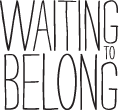The importance of personal identity
How parents can help shape an adopted child's sense of self
By Angie Appenheimer
Sooner or later, every adopted child will wrestle with the question, Who am I? Their view of themselves will be greatly affected by the information shared with them and how it is perceived. Adoptive parents in particular are tremendously influential in shaping their child’s sense of identity. Along the journey, parents need to embrace opportunities for healthy communication and exploration to help foster positive identity.
My story began when I was adopted at 14 months of age. As a young child, I was told that God knew how much my parents wanted children and so He had given them a gift – me! According to my parents, I was delivered to their door by angels. I cherished the story; I felt safe, secure and much loved.
When I entered school, however, I encountered unexpected questions: “How come you’re so tall and your parents are so short? Are you from Pakistan? You’re weird.” It didn’t help that I looked completely different from my adopted sister. As much as I loved school, I hated feeling different. I didn’t know how to deal with the questions or the teasing. I fabricated stories to get kids off my back. My mom suggested that I ignore their questions. Adoption wasn’t talked about then; it became our family secret. Many days, I found it incredibly difficult to go to school.
As I grew, so did my curiosity. I began to ask more questions. Even though my adoption had been a closed adoption, I assumed that my parents would willingly fill in the unknowns. Instead I heard, “I don’t want to talk about this. Don’t let it bother you so much.” I know that my parents struggled with how to communicate my story, but these were empty words to a curious child.
In my teens, my parents divorced and it was during this time of tension and uncertainty that I experienced an intense identity crisis. Once again I asked, Who am I? My life felt like a broken puzzle. I often wondered where I had come from and why. Knowing very little about my adoption added to my internal flurry of doubt and insecurity. This insecurity followed me well into my adult years.
When I lacked the proper tools and understanding, I saw adoption as shaping me negatively. But as an adult, I became an active participant in my adoption journey. I requested information, searched for my birth mother and learned about adoption issues. As life’s challenges came, I received them and accepted the growth and maturity they offered. In all things related to my adoption, I’ve learned to pray as Saint Francis did, “Lord grant me the serenity to accept the things I cannot change, the courage to change the things I can, and the wisdom to know the difference.”
What advice would I give to adoptive parents? Learn as much as you can about adoption, and stay in touch with your child’s thoughts and emotions. Demonstrate your willingness to be open and transparent on every front. Vulnerability and honesty will say to your adopted child, “You deserve to know. Your story matters.” Children will feel safe and secure knowing that they can ask anything. It will take prayer, courage, patience and perseverance, and it will be well worth it!
© 2011 Angie Appenheimer. All rights reserved.
